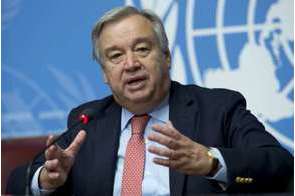Okonjo-Iweala puts African leaders to task on economic growth, climate resilience

Summary
The Global Commission on the Economy and Climate says Africa needs a faster pace of economic transformation to make progress.
Sub-Saharan Africa's (SSA) economic growth is set to slow to its lowest level in more than two decades, as average growth is projected to fall to 1.4 per cent in 2016. However, a new report by the New Climate Economy, a project of the Global Commission on the Economy and Climate (GCEC), says a faster pace of economic transformation will provide SSA with the potential to make progress on three closely linked objectives: achieving robust long-term growth; promoting rapid poverty reduction and social inclusion; and acting to reduce climate risk.
The report, Africa’s New Climate Economy: Economic Transformation and Social and Environmental Change, was released on Friday, stating that SSA's current wave of weak economic growth due to the slump in commodity prices can be revived with the right economic transformation policies.
Ngozi Okonjo-Iweala, former Nigerian finance minister and a member of the Global Commission on the Economy and Climate, said, “The choices that African leaders make in the next few years will have major implications for economic growth, human well-being and climate resilience in the decades ahead. It’s encouraging to see these three priorities brought together.”
Experts say Africa is at risk of reversing its poverty reduction gains due to the region’s high vulnerability to climate change, having experienced a median loss of 4 per cent in GDP to the impacts of global warming.
For a region that experienced a "growth miracle" over the last decade to 2014, one estimate shows SSA added about 1 per cent to productivity growth since 2000, rising as high as 4 per cent for Rwanda, and 2-3 per cent for Nigeria, Tanzania and Uganda. Sub-Saharan Africa is still at an early stage of productivity across its economic sectors, which has around 60 per cent of employment in agriculture and only 5 per cent in manufacturing. This means that the potential for increased productivity in the region is enormous. The report shows that with an effective economic transformation plan, productivity will be boosted within sectors as workers shift from low-productivity sectors like agriculture to high-productivity sectors like industry and services.
“Across multiple sectors, economic, social, and environmental transformations can reinforce each other and create numerous virtuous circles,” says Milan Brahmbhatt, lead author of the report. “Many of the policy and institutional reforms needed to boost growth and reduce poverty over the next 15 years will also contribute to better management of climate risk.”
The report details actions that can promote economic transformation and green growth in four key economic systems: cities, land use, industry, and energy.
Unleashing the power of urbanization: By 2050, the population in SSA’s cities will increase by almost 800 million people. Urbanisation in Africa, which has been something of a missed opportunity so far, can be tapped by creating more connected and coordinated cities to benefit more people, reduce air pollution and traffic costs.
Transforming agriculture and land use: Cropland in sub-Saharan Africa is expanding at twice the global rate due to low yields and rapid population growth. The New Climate Economy report says intensifying yields per hectare with climate-smart agriculture techniques can help boost farmers’ incomes while protecting the environment.
Diversification into manufacturing and other high-productivity, modern sectors: Africa’s share of world manufactured export markets is so tiny – less than 1 per cent – that even modest increases in its share can have a big impact on the sector’s growth.
Fostering a modern energy transition: About 620 million people in SSA lack access to electricity. The report says countries have an opportunity to “leapfrog” to modern, energy efficient technologies. The region has a rich portfolio of clean energy assets, including about 1,100 gigawatts of solar capacity, more than enough to meet total energy demand in the region.
The Global Commission on the Economy and Climate is an independent initiative established to examine how countries can achieve economic growth while dealing with the risks posed by climate change. It was established by seven countries: Colombia, Ethiopia, Indonesia, Norway, South Korea, Sweden and the United Kingdom. The Commission is Chaired by former Mexican President Felipe Calderón, and co-chaired by British economist Lord Nicholas Stern.
Others who contributed to the Africa’s New Climate Economy report are the Overseas Development Institute (ODI), and ODI’s Supporting Economic Transformation Programme. The research was led by Milan Brahmbhatt (the lead author) and Russell Bishop.
Related
-
AfDB recommends targeted fiscal, monetary policies to fight Covid-19
In the worse-case scenario, Nigeria's GDP is forecast to contract by 7.2 per cent in 2020 and grow by 0.1 per cent in 2021.
-
U.S think tank advocates less taxes, fossil fuel and property rights for Africa to develop
Competitive Enterprise Institute proposes policies that promote economic freedom, limited government, affordable energy.
-
UN, AU sign framework on peace and security in Africa
The joint UN-AU framework is expected to boost cooperation between the two organizations.








